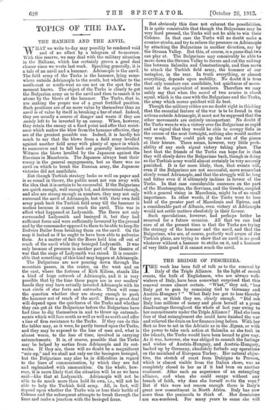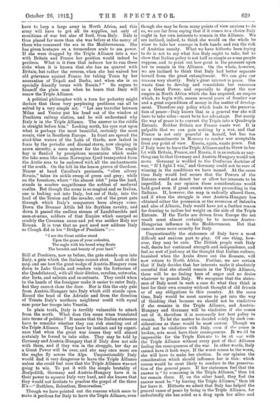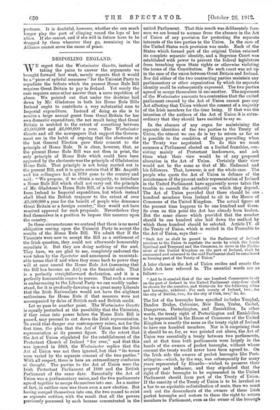THE BRIDGE OF PESCHIEB.A. T HE week has been full of
talk as to the renewal by Italy of the Triple Alliance. In the light of recent events, the bulk of Englishmen, who are always well- wishers of Italy, have been somewhat surprised that this renewal seems almost certain. "What," they ask, 'has Italy got to gain by remaining tied to Germany and Austria-Hungary ? " What Italy has got to lose thereby they see, or think they see, clearly enough. " Did not Italy lose millions of money and place herself at a great disadvantage throughout the whole of last year owing to her commitments under the Triple Alliance ? Had she been free of that entanglement she could have finished the war and relieved the drain on her finances long before. With her fleet as free to act in the Adriatic as in the /Egean, or with the power to take such action at Salonika as she took in the islands, the Turks would have been bound to give way-. As it was, however, she was obliged to consult the feelings and wishes of Austria-Hungary, and Austria-Hungary, backed up by Germany, absolutely forbade any operations on the mainland of European Turkey. Her natural objec- tive, the stretch of coast from Dulcigno to Prevesa, which is almost visible from the Italian shore, was as completely closed to her as if it had been on another continent. After such an experience of an entangling alliance, and when she could escape without any breach of faith, why does she herself re-tie the rope ? But if this were not reason enough there is Italy's great new commitment in North Africa. Italy has now more than the peninsula to think of. Her dominions are sea-sundered. For many years to come she will have to keep a large army in North Africa, and this army will have to get all its supplies, not only of munitions of war but also of food, from Italy. Italy is thus placed far more than she was before at the mercy of those who command the sea, in the Mediterranean. She has given hostages on a tremendous scale to sea power. If she were dragged by the Triple Alliance into a war with Britain and France her position would indeed be perilous. What is it then that induces her to run these risks when it is known that she has no quarrel with Britain, but rather the reverse, when she has waived her old grievance against France for taking Tunis by her annexation of Tripoli and Barka, and when she is on specially friendly terms with Russia ? " So argues to himself the plain man when he hears that Italy will renew the Triple Alliance.
A political philosopher with a turn for pedantry might declare that these very perplexing problems can all be solved by a very simple act. " Let any traveller between Milan and Venice put his head out of the window at Peschiera railway station, and he will understand why Italy is in the Triple Alliance. The answer to the riddle is straight before him." Looking north, his eyes rest upon what is perhaps the most beautiful, certainly the most scenic, view in Southern Europe. In front are spread the steel-blue waters of the Lake of Garda, now lashed in foam by the periodic and diurnal storm, now sleeping in azure security, a mere mirror for the hills. The ample bay is flanked by precipitous mountains which make the lake seem like some Norwegian fjord transported from the Arctic seas to be endowed with all the enchantments of the south. On the left lie the lemon groves of Gardone. Nearer at hand Catullus's peninsula, " olive silvery Sirmio," takes its sickle sweep of green and grey ; while on the foreshore, where " the almost islet " joins the land, stands in sombre magnificence the noblest of medieval castles. But though the scene is so magical and so Italian, one is looking not into Italy, but out of Italy, into the laud of the Teuton and the invader, out of the great gate through which Italy's conquerors have always come. Down the Brenner Attila led his Scythian cavalry, and down it passed the endless stream of Landsknechts and men-at-arms, soldiers of that Empire which usurped so crudely the Caesarean name and yet was neither Holy nor Roman. It is true that no poet need now address Italy as Clough did in his " Bridge of Peschiera "
"I see the Croat soldier stand Upon the grass of your redoubts, The eagle with his broad wing flouts The breadth and beauty of your land."
Still at Peschiera, now as before, the gate stands open into Italy, a gate which the Italians cannot shut. Look at the map and see how the great wedge of Austria-Hungary runs down to Lake Garda and renders vain the fortresses of the Quadrilateral, with all their ditches, ravelins, outworks, star forts, and salients and re-entrants. They could when in the hands of the foreigner make it easier to enter Italy, but they cannot close the door. Nor is this the only gate from Austria-Hungary into Italy which still stands open. Round the head of the Adriatic and from the direction of Trieste Italy's northern neighbour could with equal ease pour her troops into Venetia.
In plain truth, Italy is terribly vulnerable to attack from the north. What does this mean when translated into terms of politics ? It means that the Italian statesmen have to consider whether they can risk standing out of the Triple Alliance. They know by instinct and by experi- ence that when the great war comes they will almost certainly be forced to take sides. They may be told by Germany and Austria-Hungary that if Italy does not side with them, and if they win in the struggle, her day as a Great Power will be over, and she may once more see the eagles fly across the Alps. Unquestionably Italy would find it very dangerous to leave the Triple Alliance unless she could feel sure that the Triple Alliance was not going to win. To put it with the simple brutality of .Recripolitik, Germany and Austria-Hungary have it in their power to squeeze Italy very hard, and she knows that they would not hesitate to practise the gospel of the three R's—" Ruthless, Relentless, Remorseless."
Though we have pointed out the reasons which seem to make it perilous for Italy to leave the Triple Alliance, even though she may be from many points of view anxious to do so, we are far from saying that if it comes to a choice Italy ought in her own interests to remain in the Alliance. We are inclined, indeed, to think she would on the whole be wiser to take her courage in both hands and run the risk of Austrian enmity. What we have hitherto been trying to do is not to say what line Italy ought to take, but to show that Italian policy is not half so simple as some people suppose, and to point out how great is the pressure upon her to remain in the Alliance. On the whole, however, we are inclined to think that Italy had better separate herself from the great entanglement. We can give our reasons very shortly. Italy's great. interest is peace. She wants time to develop and consolidate her resources as a Great Power, and especially to digest the new empire in North Africa which she has acquired, an empire which, to begin with, means several years of frontier war and a great expenditure of money in the matter of develop- ment. Therefore any policy which leads to the preserva- tion of peace—Italy knows that in a general war she will have to take sides—must be to her advantage. But surely the way of peace is to convert the Triple into a Quadruple Entente. Neither Britain nor France wants war. It is palpable that we can gain nothing by a war, and that France is not only peaceful in herself, but has too many commitments in Morocco to render war acceptable from any point of view. Russia, again, wants peace. But if Italy were to leave the Triple Alliance and to throw in her lot with Britain, France, and Russia, it is as certain as any- thing can be that Germany and Austria-Hungary would not move. Germany is wedded to the Confucian doctrine of war, " If I fight I win," and Germany could not be sure of winning in the conditions we have named. At the same time Italy would feel secure that the Powers of the Entente would not desert her or allow her interests to be imperilled. In our opinion these considerations would hold good even if great events were not proceeding in the Balkans. If, however, the map is radically altered there, and if when the struggle is over Austria-Hungary has obtained either the possession or the reversion of Salonika and also of Albania, Italy would have yet a further reason for desiring to incline her weight on the side of the Triple Entente. If the Turks are driven from Europe the net result must almost certainly be to increase Austro- Hungarian influence in the Mediterranean. But that cannot mean more security for Italy.
Unquestionably the statesmen of Italy have a most difficult and anxious part to play. Of one thing, how- ever, they may be sure. The British people wish Italy well, desire her continued strength and independence, and feel no sort of jealousy at the thought that Italian culture, banished when the Arabs drove out the Romans, will now return to North Africa. Further, we are certain that if Italy decides that her interests make it absolutely essential that she should remain in the Triple Alliance, there will be no feeling here of anger and no desire whatever to punish Italy. We recognize that the states- men of Italy must in such a case do what they think is best for their own country without thought of old friends or of any obligations to this country. At the same time, Italy would be most unwise to get into the way of thinking that because we should not be vindictive if she remains in the Triple Alliance, and Austria- Hungary and Germany will be vindictive if she comes out of it, therefore it is necessarily her best policy to remain. To let the matter be decided solely by such con- siderations as these would be most unwise. Though we shall not be vindictive with Italy, even if the peace is broken, acts must have their consequences. It world be impossible for the Triple Entente to be at war with the Triple Alliance without every part of that Alliance feeling the consequences of the war. In other words, Italy cannot have it both ways. If the worst comes to the worst, she will have to make her election. In our opinion the consideration which should influence her is this : which course would be most likely to conduce to the preserva- tion of the general peace. If her statesmen feel that the answer is " by remaining in the Triple Alliance," then let her remain there. If, on the other hand, they feel the answer must be " by leaving the Triple Alliance," then let her leave it. Hitherto we admit that Italy has helped the general cause of peace by being in the Triple Alliance, for undoubtedly she has acted as a drag upon her allies and partners. It is doubtful, however, whether she can much longer play the part of clinging round the legs of her allies. If she cannot, and if she will in future have to be dragged by them wherever they go, remaining in the Alliance cannot serve the cause of peace.




















































 Previous page
Previous page